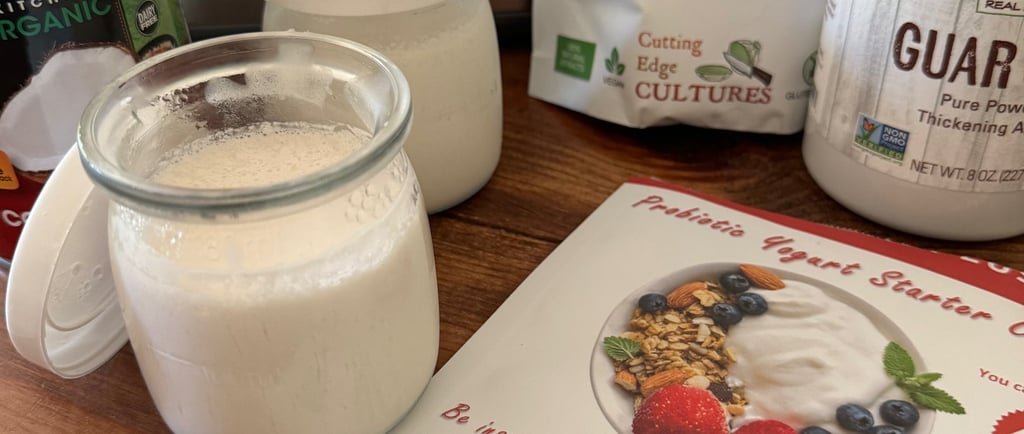The Probiotic Power of Cultured Yogurt:Enhancing Gut Health and Beyond
"Discover the incredible health benefits of cultured yogurt in our latest blog post! Learn about the key probiotic strains that enhance gut health, reduce inflammation, and improve mood. We also guide you through the essential equipment needed to start making your own nutritious yogurts at home. Dive into the world of fermented foods with us and find out how simple dietary additions can lead to profound health improvements. Perfect for anyone looking to boost their digestive health and overall wellness!"
Debbie
4/18/20243 min read


Introduction
Cultured yogurt isn't just a delicious snack; it's a powerhouse of beneficial bacteria essential for maintaining a healthy gastrointestinal (GI) tract. As awareness of gut health's crucial role in overall wellness increases, more people are turning to probiotic-rich foods like cultured yogurt. This blog post will explore the specific strains of bacteria that make these yogurts so beneficial, the equipment needed to make them at home, and how these delightful treats can be a part of your health routine.
Benefits of Cultured Yogurts
Cultured yogurts offer more than just good taste; they are rich in probiotics, which are live microorganisms that provide health benefits when consumed. These probiotics colonize the GI tract, helping to balance the gut microbiota, which is essential for digestion, absorption of nutrients, and immune function. Regular consumption of cultured yogurts can aid in maintaining this balance, potentially reducing gastrointestinal issues such as diarrhea, constipation, and bloating. Additionally, a healthy gut microbiota is linked to improved mood, better immune response, and even weight regulation.
Key Bacterial Strains and Their Benefits
Lactobacillus reuteri (L. Reuteri): This strain is renowned for its ability to inhibit the growth of harmful bacteria and enhance immunity. It's particularly effective in producing the hormone Oxytocin, reducing gastrointestinal distress and improving digestion.
Lactobacillus gasseri (L. Gasseri): Known for its implications in weight management, L. Gasseri helps regulate the metabolism, builds muscle, and can aid in weight loss when combined with a healthy diet.
Lactobacillus plantarum (Plantarum): This strain is crucial for strengthening the gut barrier, reducing inflammation, and may help in the management of irritable bowel syndrome (IBS).
Bifidobacterium bifidum (B. Bifida): Known as the "Youth Bacteria" It enhances vitality of the skin, essential for the proper digestion of dairy products and complex carbohydrates, this strain also enhances the immune system, making it a vital component of any probiotic regimen.
Examples of Cultured Foods Containing Beneficial Bacteria
In addition to homemade cultured yogurt, there are several other fermented foods rich in beneficial probiotics. Lactobacillus reuteri is often found in fermented milk and some cheeses, enhancing immunity and digestion. Lactobacillus gasseri, prominent in kefir and certain cheeses, aids in metabolism and weight management. Lactobacillus plantarum thrives in sauerkraut, pickles, and other fermented vegetables, supporting gut health and reducing inflammation. Bifidobacterium bifidum is commonly present in some yogurts and fermented milks. Additionally, miso and tempeh are excellent sources of Lactobacilli and other beneficial microbes, helping with digestive health and nutrient absorption. Natto, a fermented soybean product, is particularly rich in Bacillus subtilis, known for supporting gut health and immune function. These diverse foods offer various ways to integrate beneficial bacteria into your diet.
Health Benefits of Probiotic-Rich Foods
The broad spectrum of probiotics found in cultured foods offers a range of health benefits that extend beyond gut health. These include:
Inflammation: Regular consumption of fermented foods can help reduce systemic inflammation, a root cause of many chronic conditions.
Sleep Quality: Some probiotics found in these foods produce neurotransmitters like serotonin, which can improve sleep quality.
Mood and Mental Health: The gut-brain axis means that a healthy gut can positively impact mood, reducing symptoms of anxiety and depression.
Weight Management: Certain strains like L. gasseri are linked to reduced body fat and improved metabolic functions.
Skin Health: Probiotics can influence skin health, reducing occurrences of conditions like eczema due to their anti-inflammatory properties.
Milks you can use to make cultured Yogurts
Coconut Milk- homemade or canned / not carton
Full Fat Cows milk
Goats Milt
Almond Milk / Not carton - Fresh or simple ingredients Like Malk Brand
Equipment for Culturing Yogurt at Home
To make your own cultured yogurt, you'll need the right equipment to ensure the process is both efficient and successful. Here are three tools that can help:
Sous Vide: This device ensures that the yogurt maintains a consistent temperature throughout the fermentation process, which is critical for the growth of probiotics.
Luvele Yogurt Maker: Ideal for those who want to experiment with different fermentation times and temperatures, this maker allows for customization according to the specific bacterial strains you're using.
The Ultimate Yogurt Machine: With user-friendly features and settings for various yogurt textures and consistencies, this machine is perfect for beginners and experienced yogurt makers alike.
Conclusion and Contact Information
Incorporating cultured yogurt into your diet can significantly improve your digestive health and overall well-being. By understanding the benefits of different bacterial strains and using the appropriate equipment, you can easily make these nutritious yogurts at home. If you're interested in learning more about cultured yogurts or need guidance on how to start making them, please feel free to reach out.

